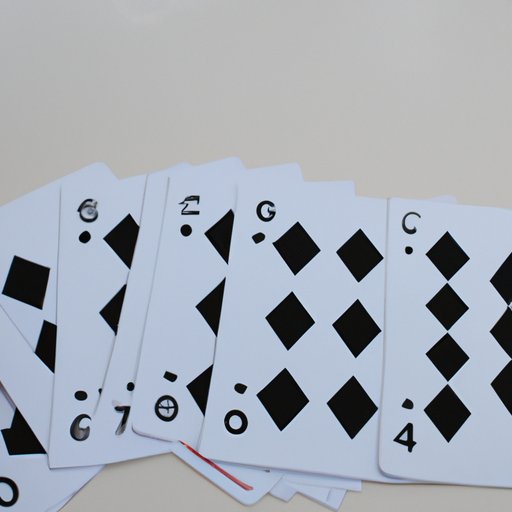Introduction
Counting cards is a popular strategy used by many players at casinos to increase their odds of winning in certain card games, such as blackjack. By keeping track of the cards that have been played, card counters can gain an edge over the house. While it is possible to learn how to count cards, it takes a great deal of practice and dedication to become a successful card counter. This article will provide an overview of the basics of counting cards, as well as explore the techniques, strategies, and legal implications involved in this practice.
Explaining the Basics of Counting Cards: A Beginner’s Guide
Card counting is a technique used by players to calculate the probability of certain cards being dealt from a deck. By keeping track of the cards that have been played, card counters can gain an edge over the house. The goal of card counting is to identify when the remaining cards in the deck are favorable to the player. This allows the card counter to make more profitable bets and to reduce losses when the deck is unfavorable.
The basic principles of counting cards involve assigning a numerical value to each card in the deck. Low-value cards, such as 2s through 6s, are assigned a positive value, while high-value cards, such as 10s, face cards, and aces, are assigned a negative value. The card counter then adds up the values of the cards as they are dealt, and uses this information to determine the likelihood of certain cards being dealt.
There are several different types of card counting strategies. The most common strategies are the Hi-Lo system, the Omega II system, the Red Seven system, and the Zen Count system. Each of these systems has its own set of rules, but the basic premise is the same: the card counter keeps track of which cards have been played, and uses this information to make more informed decisions about which cards to bet on.

Uncovering the Mysteries of Card Counting
The mathematics behind card counting is complex, but understanding it can help card counters gain a better understanding of the probabilities involved in each situation. By analyzing the odds of winning with card counting, players can develop effective card counting techniques and strategies that can be used to maximize profits. Additionally, there are several variations of counting cards, such as single deck, double deck, and multi-deck counting, which can be used to tailor a card counting system to a specific game.
How to Master the Art of Counting Cards
Learning how to count cards is not easy, but it can be done. The key to success is to practice counting cards in a safe environment. This can be done by playing online or at home with friends, or by using a card counting simulator. Additionally, developing effective card counting techniques is essential for success. This includes learning the basics of card counting, as well as understanding the different variations of counting cards and implementing card counting strategies.
The Advantages and Disadvantages of Counting Cards
While card counting can be a lucrative endeavor, it is important to understand the potential risks involved. Card counting is illegal in many casinos, and players may be banned or even arrested if caught. Additionally, card counting is a difficult skill to master, and it can take years of practice before a player can become an effective card counter. Despite its risks, card counting can be a profitable strategy if done correctly.

Strategies for Successful Card Counting
In order to be successful at card counting, players must first build a counting system. This involves creating a system for keeping track of the cards that have been played, as well as implementing various card counting strategies. Additionally, players should practice their counting skills in a safe environment before attempting to use them in a real-world casino. Finally, players should familiarize themselves with the mathematics behind counting cards and understand the expected value of card counting.

Understanding the Mathematics Behind Counting Cards
The mathematics behind card counting is complex, but understanding it can help players gain a better understanding of the probabilities involved in each situation. In particular, players should familiarize themselves with probability theory and calculate the expected value of card counting. This will allow them to make more informed decisions about which cards to bet on and when. Additionally, players should understand the different variations of counting cards and be aware of the potential risks involved.
Exploring the Legal Implications of Counting Cards
Card counting is illegal in many U.S. states. In most cases, players can be fined or banned from the casino for card counting. Additionally, some casinos may take legal action against players who are caught counting cards. It is important for players to understand the laws regarding card counting in their state before attempting to count cards in a casino.
Conclusion
Counting cards is a popular strategy used by many players to increase their odds of winning in certain card games. By keeping track of the cards that have been played, card counters can gain an edge over the house. This article provided an overview of the basics of counting cards, as well as explored the techniques, strategies, and legal implications involved in this practice. Understanding the mathematics behind counting cards, building a counting system, and practicing in a safe environment are all essential components of becoming a successful card counter.
(Note: Is this article not meeting your expectations? Do you have knowledge or insights to share? Unlock new opportunities and expand your reach by joining our authors team. Click Registration to join us and share your expertise with our readers.)
